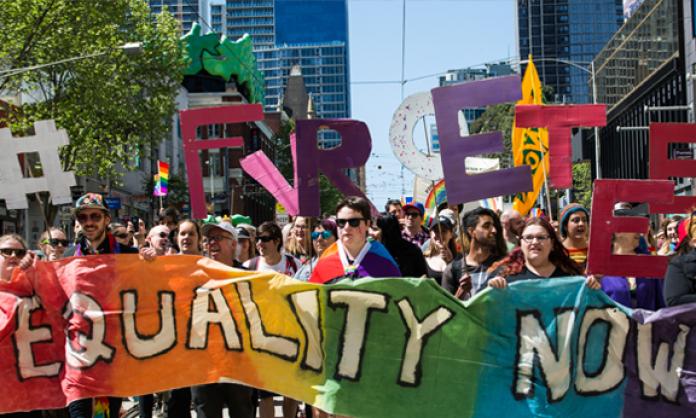“There is something about being forced to the catacombs that electrifies the atmosphere. A movement to advocate for the good of man-woman marriage was forged that night in secret in Sydney.”
Lyle Shelton, director of the Australian Christian Lobby, has been reflecting on his organisation having its anti-LGBTI conference shut down recently after pressure was brought to bear on the proposed venue, the Sydney Airport Mercure Hotel, which pulled out from hosting the event.
While the literary world awaits with bated breath Shelton’s memoirs detailing the suspense and drama of the ACL’s clandestine years, the fact remains that prime minister Malcolm Turnbull and his government continue to do everything they can to appease Shelton and the homophobic right of the Liberal Party.
The proposed plebiscite on marriage equality is not a way to ensure that the Australian population has a more democratic say over the issue. Poll after poll shows that about 60 percent of people, a clear majority, support marriage equality.
In the 12 years since the Howard government banned marriage equality, thousands of people across the country have taken over the streets of our cities time and time again, calling for equal rights.
It’s also increasingly apparent that a majority of MPs support marriage equality, with 76 out of 150 lower house MPs and 41 out of 74 senators in favour of overturning the ban, according to Australian Marriage Equality.
When it came to other contentious issues over the last decade – going to war in Iraq, introducing WorkChoices, locking up refugees offshore – governments have not once sought a plebiscite to gauge popular opinion. Why now? Because Turnbull has a precarious grip on power and needs to keep the right wing of his party on side.
This plebiscite is the right’s last ditch attempt to halt the momentum of the marriage equality campaign. It places one more obstacle on the path to victory.
The plebiscite strategy might seem counter-intuitive considering that a majority of Australians support the demand for marriage equality. Perhaps the conservatives thought that by delaying the question, they could turn some of that support around. Perhaps they thought that they could word the question in an unfavourable way and engineer a defeat reminiscent of the republic fiasco.
The thing they want to avoid for certain, however, is a free parliamentary vote, which they would lose.
The longstanding demand of the campaign continues to be that parliament pass marriage equality. With a number of private member’s bills in the wings, at least one could be put to a vote and passed if a free vote were granted by both parties. Supporters of marriage equality shouldn’t have to drop this demand to satisfy the likes of Cory Bernardi and George Christensen.
LGBTI groups overwhelmingly are against the plebiscite. A survey of LGBTI people in July by Parents and Friends of Lesbians and Gays Australia found that 85 percent opposed it. Of course, if the plebiscite were to become a reality, marriage equality supporters shouldn’t shy away from taking up the fight for a “yes” vote. But that doesn’t mean throwing support behind a plebiscite that almost all LGBTI people oppose and that is supported only by the Liberals.
At a “consultation” initiated by attorney-general George Brandis on 6 October, the more than 20 LGBTI organisations present were unanimous in rejecting the plebiscite and demanding a free vote. Cat Rose, co-convener of Community Action Against Homophobia, said to Brandis, “That is a pretty resounding response from everyone here that we want marriage equality and we want a free vote on it!
“The government would have us believe that it is either a plebiscite or nothing. Well, I think I speak for everyone here when I say that is absolutely not going to happen because we will fight you [for marriage equality] every minute of the way.”
The national campaign for marriage equality has been successful not only in keeping the issue in the media and on the political agenda. By galvanising its supporters, it has also shifted public opinion from minority support when the campaign first began in 2004 to the popular support the demand enjoys today.
If the plebiscite proposal is blocked by opposition parties in the Senate, it’s not a signal to wait three more years for the Labor Party to get into office. The fight would need to continue immediately.
In recent years, millions around the world have fought against homophobia and transphobia to demand their governments allow LGBTI couples the right to have their relationships legally recognised. The demand has been won in country after country. Our government has the power to allow LGBTI couples in Australia that same right: we just have to keep the pressure on it to make it happen.








